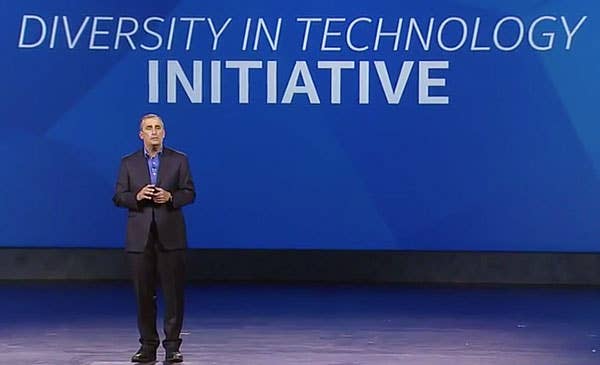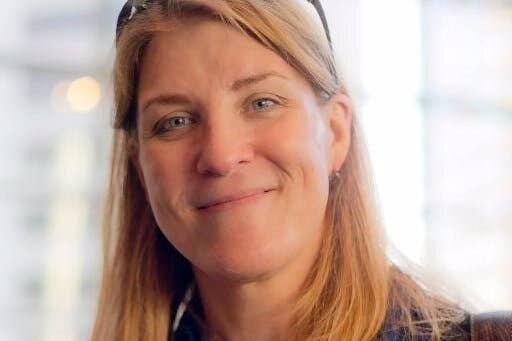IGDA: Gender, GamerGate and the need for action
"We need to do something, to change the situation and stop talking about it over and over again"
For much of the last year, Kate Edwards' job has been dominated by two topics, connected by a gnarled sinew of threat and fear and recrimination. Gender balance within the industry has been a pressing issue for as long as I've been working for GamesIndustry.biz, but the odious sequence of events eventually christened as "GamerGate" was a flashpoint. It made serious, difficult discussion an absolute necessity, and, as executive director of the International Game Developers Association, Edwards was often at the very centre.
Edwards is in Beirut to give a keynote address at the inaugural MEGA Games Conference, the first event of its kind in the Middle East and North Africa. A few minutes before our meeting, she was addressing a crowd of developers from every country in the region, all hungry for insight into how to create games for the international marketplace. This, too, is a vital part of her job, and after a very difficult year she can now give it more time and attention.
"The impact of GamerGate has been to raise the conversation to a level that we've been wanting for a long time"
"My biggest issue is that we've been talking about this forever," she tells me, when we meet after her talk. "Despite the fact that the IGDA has been targeted very heavily, and I personally have been targeted very heavily - I mean, I've been dragged through the mud more times than I can count - but besides that, the impact of it has been to raise the conversation to a level that we've been wanting for a long time.
"I go to many different events around the world, and usually to the token 'Women in Games' lunch, dinner, talk or what have you. I was at one lunch and a woman stood up and said, 'I cannot wait till the day that we never have to do this again.' She was applauded in the room, and I think a lot of us feel exactly the same way."
It may seem odd to reflect on GamerGate as a positive force, but Edwards sees real value in doing so. The key now, she says, is action; taking the energy that has been devoted to debating the problem and pulling it apart, and channelling it into pragmatic solutions. For people to remain engaged with the issue, it is time to set goals and offer results.

"What's come out of it is that we actually need to do something," she says, "to change the situation and stop talking about it over and over and over again. I've heard that frustration from people who would consider themselves moderate - 'Why do we have to keep on talking about it?'"
Which is not to say that discussion has no value, of course - Edwards is very clear on that - only that the IGDA is now committed to giving the discussion more direction. It is too early to outline those plans in detail, but broadly speaking the organisation will be working towards acquisition and retention of women in the industry's workforce. The target is to double the number of women overall by 2025. Edwards calls this a "space programme," a nod to the optimism and ambition of the Apollo missions she watched on TV as a child.
"There have been a lot of complex discussions, and I'm glad for that," she says. "It's not black and white. Great, so we're going to change this and make it better. What, exactly, are we going to do? That's what we've been talking about for the last few months, and we've got some concrete ideas."
"It's about the desire to see it through to the end, and to actually make it happen. That's what we need to do here"
However, the IGDA alone will not be enough, even with the help of so many proactive individuals in the wider community. Indeed, the sheer weight of responsibility placed on the those caught up in GamerGate - while many of the industry's biggest and most influential companies remained silent - was one of the more troubling aspects of the last year. If real progress is to be made, it will be necessary for the industry to shoulder some of that burden, to use their resources and their reach to back up their well-intentioned public statements.
The best example of this, Edwards says, is Intel's $300 million fund to promote diversity in tech industries. Of course, that followed the company's own ill-advised response to GamerGate pressure, but Edwards has been left with no reason to doubt its sincerity. All that remains now is to see if the games industry's biggest players will follow with anything as encouraging and concrete. At the very least, Edwards has faith that they will.
"Having spoken with Brian [Krzanich, CEO of Intel] since that time, I'm convinced that he is utterly focused on making serious change. He said to me that it isn't even about the money. It's about the desire to see it through to the end, and to actually make it happen. That's outstanding. That's what we need to do here.

"It has been an unpleasant experience, it has been personally damaging, but what I like is the potential outcome: the very thing that those voices were speaking out against is really going to happen. They might still tell each other, 'We're going to win this' - whatever it is they are trying to 'win' - but, honestly, I don't even pay them that much attention any more."
That isn't necessarily the case for the developers Edwards represents, however. In February, the veteran game developer Mark Kern issued a petition in response to an episode of the TV series Law and Order: SVU, which took GamerGate and sexual harassment and recycled them into a cynical crime-of-the-week plotline. This episode, Kern argued, had helped, "set back the public image of the video games by years if not decades," and it was the "inevitable result" of "yellow journalism" from popular sites like Kotaku, Polygon and VG247. GamerGate had become a reliable source of traffic, he said, and the press had seized the opportunity to take their share.
"There's no interest in dialogue. At all. It's not about that for GamerGate"
Edwards is understandably reluctant to take a position on whether the press capitalised on the discussion around GamerGate, ultimately damaging the perception of the industry in the process. All news, regardless of subject, tends to be somewhat sensationalised now, she says, but Kern's petition was significant of something quite different.
"You get some people who sit on this fence, and they can gather a group of apologists from the GamerGate side who will take their side," she says. "That becomes attractive, because somebody agrees with or likes what they're saying. I understand that there are people like [Kern], who want to somehow be this bridge. I made my own attempts at that, but it's always been very clear to me, in any attempt I made, that there's no interest in dialogue. At all. It's not about that for GamerGate. It's about forcing opinion on other people.
"What I'll keep doing, and what I tell developers to do: protect yourself online and in person, and keep focused on making great games."

